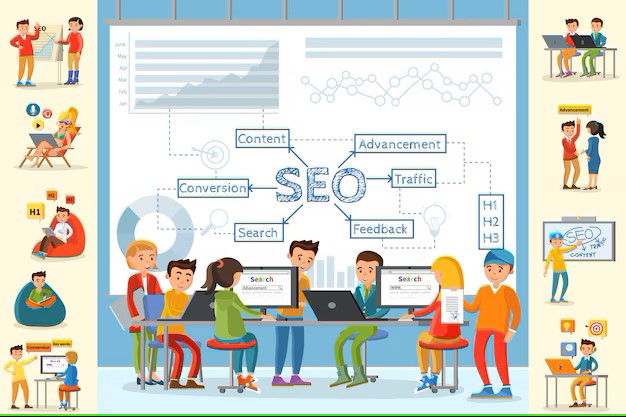
SEO Role: What is the role of SEO in Digital Marketing?
The Role of SEO in Digital Marketing
In the digital age, where a significant portion of consumer interactions and business transactions occur online, the role of Search Engine Optimization (SEO) in digital marketing cannot be overstated. SEO is the art and science of enhancing a website’s visibility on search engines like Google, Bing, and Yahoo. This visibility is crucial for driving organic (non-paid) traffic to websites, which can lead to increased brand awareness, customer engagement, and revenue.
What is SEO?
At its core, SEO involves optimizing various aspects of a website to make it more attractive to search engines. This includes:
- Keyword Research: Identifying the terms and phrases that potential customers are using to search for products or services similar to what you offer.
- On-Page Optimization: Enhancing individual web pages to rank higher and earn more relevant traffic in search engines. This includes optimizing meta tags, headers, content, and images.
- Technical SEO: Improving the technical aspects of a website to ensure that search engines can crawl and index it effectively. This includes optimizing site speed, mobile-friendliness, and secure connections (HTTPS).
- Content Creation: Developing high-quality, valuable content that meets the needs of your audience and aligns with search intent.
- Link Building: Acquiring back links from other reputable websites to improve your site’s authority and trustworthiness.

Why SEO is Essential in Digital Marketing?
- Increased Visibility and Traffic The primary goal of SEO is to increase a website’s visibility on search engine results pages (SERPs). When your site appears at the top of the SERPs for relevant keywords, it attracts more clicks and traffic. Studies have shown that the majority of users do not scroll past the first page of search results, highlighting the importance of ranking highly.
- Cost-Effectiveness Unlike paid advertising, SEO focuses on driving organic traffic. While it requires an investment of time and resources, the long-term benefits often outweigh the costs. Once your site is well-optimized and ranks highly, you can attract consistent traffic without ongoing ad spend.
- Building Trust and Credibility High search engine rankings are often perceived as a vote of confidence from search engines. Users trust Google and other search engines to provide relevant and trustworthy results. By appearing at the top of the SERPs, your brand gains credibility and trust from potential customers.
- Enhanced User Experience SEO involves optimizing various elements of a website to improve user experience. Fast-loading pages, mobile-friendly design, and high-quality content all contribute to a positive user experience. Search engines prioritize sites that offer a great user experience, which can lead to higher rankings and more traffic.
- Competitive Advantage In today’s competitive digital landscape, SEO is a key differentiator. Brands that invest in SEO can outrank their competitors and capture a larger share of the market. By continuously optimizing your site and staying up-to-date with SEO best practices, you can maintain a competitive edge.
- Better ROI SEO often delivers a higher return on investment (ROI) compared to other digital marketing strategies. Organic traffic tends to convert better than other traffic sources because users who find your site through search engines are actively seeking information or solutions. By targeting the right keywords and optimizing your site effectively, you can attract high-quality leads and achieve better conversion rates.
The Future of SEO in Digital Marketing
As search engines continue to evolve, so too must SEO strategies. Emerging trends like voice search, artificial intelligence, and machine learning are shaping the future of SEO. Digital marketers must stay informed about these trends and adapt their strategies accordingly.
- Voice Search Optimization: With the rise of voice-activated devices like Amazon Echo and Google Home, optimizing for voice search is becoming increasingly important. This involves targeting long-tail keywords and conversational phrases.
- AI and Machine Learning: Search engines are using AI and machine learning to better understand user intent and deliver more relevant results. Marketers need to focus on creating high-quality, user-centric content that meets search intent.
- Mobile-First Indexing: Google now prioritizes the mobile version of websites for indexing and ranking. Ensuring that your site is mobile-friendly is crucial for SEO success.
If you looking for SEO and known how much SEO packages then, click this button for more information.
All Categories
Recent Posts
What is The Power of Social Media in Modern Age?
Unlocking the Power of Digital Marketing in 2024
How Modern Marketing is Better Than Traditional Marketing?





